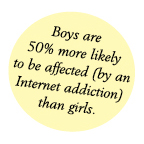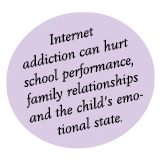Dear Dr. Garner,
I am very worried about my son. He is constantly on the computer looking at Facebook and other things that I really don’t know that much about.
His grades at school are horrible and he never gets together with friends.
It seems like he is addicted to the Internet. Is there such a thing?
Concerned Mother
Dear Concerned Mother,
These are questions which parents frequently ask. I was just talking about these issues, with my good friend and colleague, Dr. Anthony Saleh.
Obsessive use of the Internet can create mental health problems. Up to 10% of adolescents may have this addiction. From your description, it is something that I think needs to be evaluated.
There is an actual condition known as “Internet addiction,” which will shortly be added to the official list of mental diseases in the next psychiatric list of mental disorders book.
Those most at-risk are children who play online role-playing games, such as World of Warcraft.
 The addiction is defined as an “uncontrollable and damaging use of the Internet.” Boys are 50% more likely to be affected than girls.
The addiction is defined as an “uncontrollable and damaging use of the Internet.” Boys are 50% more likely to be affected than girls.
Parents should look for sharp changes in how often and how long children stay online. Increased use of Facebook may be a signal that there is a problem.
Signs of Addiction
The following are some things to look for as signs of Internet addiction:
• Preoccupation with the Internet.
• Staying online longer and longer.
• If you limit your child’s time on the computer, he or she becomes depressed, irritable or hostile.
• Use of the Internet to deal with difficult life situations.
• Your child lies about Internet use.
• He/she stops interacting with family and siblings.
• Deterioration of grades.
• A drastic change in eating habits occurs.
• Increase in daytime sleeping and overnight chatting is present.
• He or she uses constant excuses to miss school.
The typical child addicted is a boy, who is on the Internet at least 20 hours a week. This doesn’t exclude girls, but it seems to be more common in boys.
In fact, if you go on the computer and search for “Internet addiction test,” you will get a 20-question inquiry which could help verify whether there is a problem.
Many parents consider that being on the computer for long periods of time is normal. While this may be true, when it starts to interfere with studying, grades or normal eating habits, there is a problem.
Some psychiatrists believe there are three categories of Internet-addicted children:
• The youngest group, below the age of 12, is not hooked to the Internet but is addicted to computer games, which attract them.
• The next group is 12-15, which graduate from games to chatting.
• In the above 15-year-old category, it is chat groups for the girls, and viewing prohibited websites for the boys that are most prevalent.
Peer pressure plays a large role in addiction to the Internet as well.
The Internet addiction eventually affects not only your child’s mind, but also physical health. The child becomes an indoor being and rarely gets exercise.
Children, who have ADHD, depression or signs of hostility are more likely to suffer from addiction.
Online addiction can be destructive and should be taken seriously. The addiction can hurt school performance, family relationships and the child’s emotional state.
Knowing the risk factors and early intervention is the key to solving the problem.
I urge you to speak with your child and if the above risks factors are present that you bring him for counseling and psychiatric evaluation, the earlier the better.
Dr. Steven Garner is a Fidelis Care provider who is affiliated with New York Methodist Hospital, Park Slope. He also hosts “Ask the Doctor” on The NET, Tuesdays at 8 p.m. on Channel 97 Time Warner and Channel 30 Cablevision.
